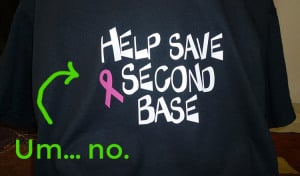
Source: AZ News
Revenge porn. Never heard of it? You probably will soon.
This new Internet craze, specifically focused on women, occurs when a person shares a sexual or nude photo or video with a partner or hookup who later decides to make the private photo public.
Promises that the photo will be kept private often disintegrate with time, especially after a breakup or falling out. But the lasting negative effects on a victim of revenge porn– not to mention the extreme difficulties of removing photos once they have hit the net – make this phenomenon a horrifying prospect for anyone who has ever taken sexy pictures for a significant other.
And in most places, it’s perfectly legal.
You read that right. Revenge porn (also known as non-consensual pornography or cyber rape) is legal in every state except California and New Jersey.
University of Miami law professor Mary Anne Franks is trying to change this by helping states write laws against revenge porn.
To naysayers who prefer to victim blame, Franks compares sharing pornographic material to making a business transaction.
“If you give your credit card to a waiter, you aren’t giving him permission to buy a yacht,” says Franks.
Sending sexual or nude photos to another person does not give them the right to share what they’ve received on a public forum such as the Internet – especially within the context of trust and under an agreement that the photos will be kept private.
Now, profiteers have even discovered a way to make revenge porn profitable. Many popular revenge porn sites, such as MyEx.Com – a website that boasts the tagline “Get Revenge! Naked Pics of Your Ex” – offers victims with a “take-down” option.
Pay up, and the site will remove your photos.
And prices are steep.
MyEx.Com has an option to “Remove My Name” which takes you to the payment site “Reputation Guard” and demands $500 for the deletion of photos and personal information from MyEx.
Simply put, this is blackmail. MyEx.Com is working along with Reputation Guard to extort money from victims of internet exploitation – and no one is stopping them.
Moreover, paying $500 will only ensure that the photos are removed from the MyEx site. Everyone knows that once a picture is on the Internet, it is there to stay.
Reputation Guard has no authority to remove the exact same photos and personal information from the possibly hundreds of other low-life websites or personal blogs on which they have ended up.
Sometimes revenge porn doesn’t include personal information or naked photos – but it can still be damaging. I know – from personal experience.
A few summers ago, on the way home from a fantastic beach vacation with a group of close friends, I got a call that broke my heart.
It was my best friend calling to tell me that pictures of me had surfaced on AutoAdmit.com, a site for Internet trolls working in the law profession or attending law school with the laughable motto “The most prestigious law school discussion board in the world.”
The pictures were all taken directly from my Facebook albums. My name wasn’t included, and the photo locations ranged from formal events to cab rides to mini golf.
We quickly discovered that I wasn’t the only victim – my friend had a page of her own. This man, whoever he was, had pilfered about thirty photos of us from our Facebook profiles and written dehumanizing and scary descriptions of the sexual things he planned to do to us.
He even claimed to be close to having a threesome with us – an utterly inexplicable lie. About eighty of his site cronies then chimed in with comments so vile that I have spent years trying to forget them.
No nudity, no personal contact info, and no names were shared. And yet I felt utterly and completely violated. I wanted the photos down, and I wanted them down now.
However, AutoAdmit (like many revenge porn sites) is unmonitored and unstaffed. It is a forum for women-bashing and body-shaming by faceless trolls sitting behind computer screens.
So what can be done in these types of situations?
Unfortunately, there aren’t too many options – yet. But let’s look at the ones that do we have.
1. Contact the Photo Hosting Service
First, get your photos taken down if you can.
In my case, my friend and I realized that our photos were being hosted on imgur.com, so we wrote to the photo editor of imgur through their Removal Request option and demanded their deletion.
It worked. The photos were down within forty-eight hours.
Photo hosting websites like imgur are looking to avoid lawsuits. They are not as interested in protecting the creeps who post revenge pictures as they are of not being sued.
Be firm, be forceful, and threaten legal action. This is the easiest way to get your photos removed from a public image hosting site.
But what about sites like MyEx where the photos are hosted internally?
Although revenge porn itself is not yet illegal in most places, there are legal guidelines concerning ownership of photos.
A recent survey discloses that 80% of revenge porn victims took the pictures in question themselves – giving them the legal rights to those photos.
Under the Digital Millenium Copyright Act of 1998 (DCMA), victims can submit a DMCA take-down request to offending websites that are using their photos without consent.
Rights protection group DMCA Defender provides relatively low-cost services to victims who want help submitting a claim.
While these are viable options, they are only marginally successful at removing images, and do nothing to punish the criminals behind online sexual harassment. So what more can we do?
We need to go further. We need to change the law.
2. Making Revenge Porn Illegal
When Annmarie Chiarini, a Maryland college professor and victim of an immense revenge porn battle that nearly ended her career and brought her close to taking her own life, went to the police with evidence that her ex-boyfriend had posted and sold naked photos of her online, the police shrugged her away.
There was nothing they could do because no crime had been committed, they said.
Similarly, advocacy group End Revenge Porn creator Dr. Holly Jacobs suffered three-and-a-half years of unrelenting fallout when police failed to prosecute her ex-boyfriend for posting her personal data and photos online.
Now women like Jacobs and Chiarini are fighting back hard to make revenge porn unlawful. They are working around the clock to get bills passed in states nationwide that will make this type of online sexual harassment illegal and create real consequences for perpetrators.
The fact that revenge porn can have deadly consequences also lends great credibility to the idea of making it a crime. Releasing a victim’s image, hometown, full name, age, and occupation can lead to stalking and physical endangerment. It can also lead to deep emotional distress and even victim suicide.
Other groups leading the fight in the US include the Cyber Civil Rights Initiative, Without My Consent, Army of She, and Women Against Revenge Porn. These sites provide fantastic resources that help victims join the fight to make revenge porn illegal.
3. Seek Mental and Emotional Support
The number of suicides linked to online sexual exploitation and revenge porn has skyrocketed in recent years.
Many arise from online harassment following a sexual assault, such as in the case of California teen Audrie Potts, who hung herself after photos of her rape were distributed online.
Others come from shame brought on by revenge porn.
Such is the case of Amanda Todd, who committed suicide after facing unending torment from school bullies over topless photos that she was pressured to send to an older man. She was in the seventh grade when she sent the photos and fifteen when she ended her life.
Revenge porn and Internet sexual harassment seek to demoralize, debase, and shame women on social, sexual, and professional levels. They are deeply painful and effective ways of making victims feel alienated, unloved, and even worthless.
Finding a psychologist or therapist who can help you navigate through the negativity is a key step to overcoming the pain induced by internet sexual harassment.
If you or someone you know begins to feel suicidal, call the National Suicide Prevention Lifeline, which provides a 24-hour hotline (1-800-273-TALK) and a therapy finder by geographical region. Using the therapy finder, you can search for licensed mental health professionals, support groups, government services, and more.
Reach out to your family and friends as well. They can provide you with a strong backbone of support in times of need.
If you don’t feel like you have anyone to turn to, a support/survivor group can also provide you with comfort and understanding. Check the websites of local sexual abuse agencies for more resources, or visit the Rape, Abuse, and Incest National Network (RAINN) site to search for other options.
4. Remember: This is Rape Culture, Not Normality
Our culture prefers to blame the victim in situations like these, saying “Why did she send this photo?” or “She got what was coming to her for being careless/slutty/sexual.”
As should be painfully obvious, and as Professor Franks demonstrates in a recent Cosmopolitan article, this is rape culture at work:
“When we say, ‘What was she doing giving out this picture?’ what we’re really saying is if you’re sexual with one person, society is entitled to treat you as sexual for all purposes,” Franks states.
“We’re telling women and girls that revenge porn is justified punishment for giving a sexy picture to a trusted partner, and that’s exactly the same thing as telling women and girls that rape is justified punishment for drinking or wearing a short skirt.”
So before you start apologizing about sending a sexy photo, think.
You are an adult. You are free to do what you want with your body (within legal boundaries). No one can tell you that you deserve to be publicly humiliated and have your trust violated because you are a sexual person. Remember that.
That said, there are undeniable risks involved with sending sexual photos to another person. Once a picture is given to someone else – whether your spouse, a friend, or a casual hookup – it is out of your immediate control.
Even if made illegal everywhere, the Internet is a big place. People will still find ways to get away with online sexual harassment and revenge porn.
But hopefully making it a crime will make it harder for them.
With prospective bills to make revenge porn and other forms of sexual Internet harassment illegal in New York and other places nationwide, the future looks a little bit brighter.
In the meantime, education about revenge porn is crucial.
***
The more people that know about this phenomenon and how to stop it, the harder it will be for creeps to get away with. And hopefully, it will become less common and accepted as people realize that it has dangerous results.
It’s just one more battle in the war against rape culture, but it’s one that we can all take part in by calling this exploitation out, educating people about why it’s not okay, and working towards making it illegal. Claim your rights.
Protect yourself. You are worth it.
[do_widget id=”text-101″]
Danica Johnson is a Contributing Writer at Everyday Feminism and the Communications Manager at the Coalition on Human Needs, an alliance of national organizations working together to promote public policies addressing the needs of low-income and other vulnerable populations. Living in Washington, DC, this West Coast native uses her free time to write for her blog Duckyfem, practice yoga and spend as much time with animals and in nature as possible. Follow her on Twitter @duckyfem and read her articles here.
Search our 3000+ articles!
Read our articles about:
Our online racial justice training
Used by hundreds of universities, non-profits, and businesses.
Click to learn more




















